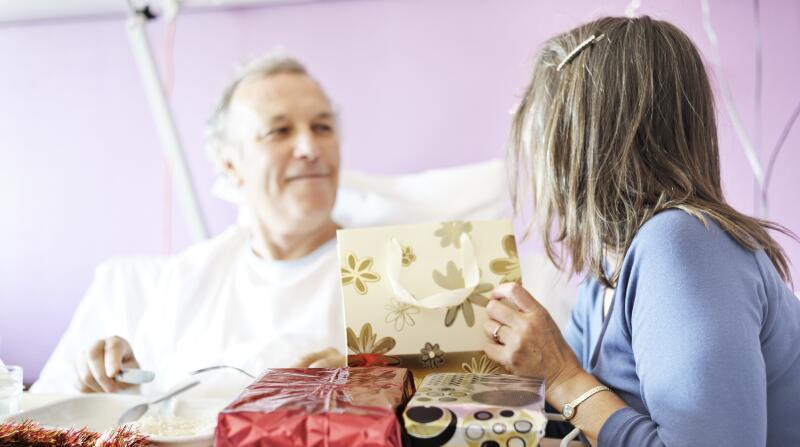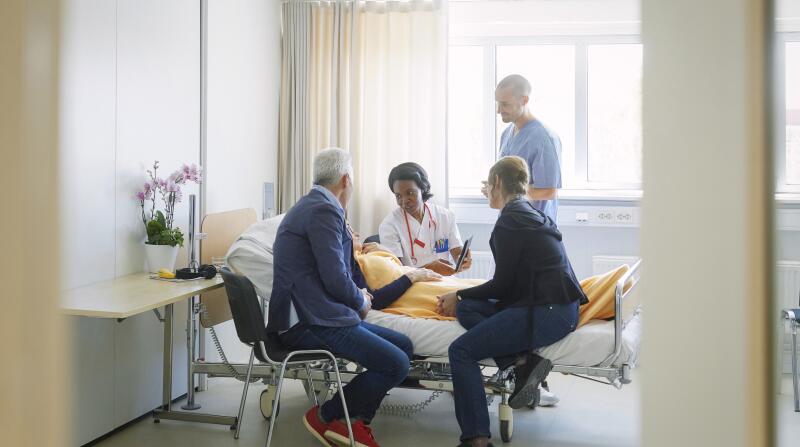9 Tips for Visiting Someone in the Hospital

Medically Reviewed By William C. Lloyd III, MD, FACS
Written By Jennifer L.W. Fink, RN, BSN on May 6, 2020
-
 Plan a safe and helpful hospital visit.Visiting someone in the hospital can provide a much-needed boost and offer emotional support—when it’s done right. Before you head out to spend time with a hospitalized friend or relative, brush up on hospital etiquette. Remember: Your role is to support the patient without interfering with their treatment or recovery. Following a few simple do’s and don’ts can be the difference between a pleasant visit and one that’s exhausting and unhelpful. Use these nine tips to plan your hospital visit.
Plan a safe and helpful hospital visit.Visiting someone in the hospital can provide a much-needed boost and offer emotional support—when it’s done right. Before you head out to spend time with a hospitalized friend or relative, brush up on hospital etiquette. Remember: Your role is to support the patient without interfering with their treatment or recovery. Following a few simple do’s and don’ts can be the difference between a pleasant visit and one that’s exhausting and unhelpful. Use these nine tips to plan your hospital visit. -
 1. Check the visitor policy.All healthcare facilities have policies that outline visitor expectations. Some hospitals—and some hospital units —restrict visitors to immediate family members only. Some don’t allow children younger than a certain age. And some hospitals have set visiting hours, while others welcome guests at all times.
1. Check the visitor policy.All healthcare facilities have policies that outline visitor expectations. Some hospitals—and some hospital units —restrict visitors to immediate family members only. Some don’t allow children younger than a certain age. And some hospitals have set visiting hours, while others welcome guests at all times.
If you’re not sure of the guidelines, call the hospital and inquire about their visitor policy. Ask about visiting hours and visitor limitations, and plan your visit accordingly. -
-
 2. Think carefully about gifts.Flowers and balloons—two traditional gifts for hospitalized patients—are no longer recommended, due to the increasing prevalence of latex allergies and fragrance sensitivities.
2. Think carefully about gifts.Flowers and balloons—two traditional gifts for hospitalized patients—are no longer recommended, due to the increasing prevalence of latex allergies and fragrance sensitivities.
It’s also not a good idea to bring food from home. Most hospitalized patients are on a special diet that’s designed to facilitate healing, and some aren’t allowed to eat or drink at all for a period of time. Don’t tempt your loved one with favorites; save the goodies until after discharge. Instead, bring something to help them pass the time. Topping the list are novels, activity books, and photos. -
 3. Keep it short.There’s a reason your friend or loved one is in the hospital: to rest and recover. Staying too long may rob the patient of some much-needed rest. Don’t count on the patient to tell you when it’s time to go. Most people are thrilled to have guests and simply want to be polite, so they might not speak up even if they’re exhausted. Instead, let them know at the outset of your visit that you only plan to stay 20 minutes or so—and then leave when time is up.
3. Keep it short.There’s a reason your friend or loved one is in the hospital: to rest and recover. Staying too long may rob the patient of some much-needed rest. Don’t count on the patient to tell you when it’s time to go. Most people are thrilled to have guests and simply want to be polite, so they might not speak up even if they’re exhausted. Instead, let them know at the outset of your visit that you only plan to stay 20 minutes or so—and then leave when time is up. -
 4. Don’t press for medical details.You don’t have the right to know all the ins and outs of the patient’s condition or medical treatment. In fact, it’s often best to let the patient direct the conversation. It’s OK to ask, “How are you feeling?,” and perfectly acceptable to ask follow-up questions if the patient offers details. If your friend says, “I’m actually hurting more today,” you can ask “Where?,” or simply say something like “Really?” or “That must be hard.”
4. Don’t press for medical details.You don’t have the right to know all the ins and outs of the patient’s condition or medical treatment. In fact, it’s often best to let the patient direct the conversation. It’s OK to ask, “How are you feeling?,” and perfectly acceptable to ask follow-up questions if the patient offers details. If your friend says, “I’m actually hurting more today,” you can ask “Where?,” or simply say something like “Really?” or “That must be hard.”
If the patient avoids talking about their condition, follow their lead and talk about something else. -
 5. Offer to step out when staff enter.Healthcare occurs ‘round the clock. Staff will try to give you some private time to visit, but if the patient is due for treatment or monitoring during your visit, they may need to proceed. If a staff member enters the room, offer to step out and wait in the hall or lounge. If the staff member is simply checking an IV pump or monitor, they may say you can stay.
5. Offer to step out when staff enter.Healthcare occurs ‘round the clock. Staff will try to give you some private time to visit, but if the patient is due for treatment or monitoring during your visit, they may need to proceed. If a staff member enters the room, offer to step out and wait in the hall or lounge. If the staff member is simply checking an IV pump or monitor, they may say you can stay. -
-
 6. Keep conversations quiet.A hospital is not a quiet place. Between the constant beep and hum of machines and staff members’ conversations, it can be next-to-impossible for hospitalized patients to get rest. Don’t add to the noise by talking and laughing loudly; keep conversations quiet. If there is more than one patient in a room, it’s especially important to be considerate. In fact, you may want to consider moving your visit to a nearby lounge, if the patient is able.
6. Keep conversations quiet.A hospital is not a quiet place. Between the constant beep and hum of machines and staff members’ conversations, it can be next-to-impossible for hospitalized patients to get rest. Don’t add to the noise by talking and laughing loudly; keep conversations quiet. If there is more than one patient in a room, it’s especially important to be considerate. In fact, you may want to consider moving your visit to a nearby lounge, if the patient is able. -
 7. Skip the perfume.Illness and medication can interfere with a person’s sense of smell. In some cases, sickness seems to heighten sensitivity to certain scents; a person may suddenly find previously acceptable odors intolerable. Plus, many people are seriously sensitive to fragrances. Exposure to strong scents can trigger allergic reactions, headaches, nausea and even shortness of breath.
7. Skip the perfume.Illness and medication can interfere with a person’s sense of smell. In some cases, sickness seems to heighten sensitivity to certain scents; a person may suddenly find previously acceptable odors intolerable. Plus, many people are seriously sensitive to fragrances. Exposure to strong scents can trigger allergic reactions, headaches, nausea and even shortness of breath.
So, skip the perfume, cologne and body spray. Aim for natural, fresh and clean instead. -
 8. Stay home if you’re sick.People who are hospitalized are particularly susceptible to illness. If you have a cough, cold, runny nose, fever, diarrhea, or contagious rash, stay home, even if you think your illness is relatively mild. Your “mild” illness could turn into a major complication for someone else.
8. Stay home if you’re sick.People who are hospitalized are particularly susceptible to illness. If you have a cough, cold, runny nose, fever, diarrhea, or contagious rash, stay home, even if you think your illness is relatively mild. Your “mild” illness could turn into a major complication for someone else.
If you can’t visit, consider a phone call. Or, write and send a note of support. Alternately, you can send your best wishes along with a mutual friend. -
 9. Wash your hands.Germs are rampant in and out of hospitals. To protect your health and the health of hospitalized patients, thoroughly wash and dry your hands when you enter the patient’s room. Do so again when you leave the room, and before eating or drinking anything.
9. Wash your hands.Germs are rampant in and out of hospitals. To protect your health and the health of hospitalized patients, thoroughly wash and dry your hands when you enter the patient’s room. Do so again when you leave the room, and before eating or drinking anything.
If a sign on the patient’s door asks you to check with the nurse before entering, do so. You may need to follow some additional precautions to prevent the spread of infection.
9 Tips for Visiting Someone in the Hospital

















